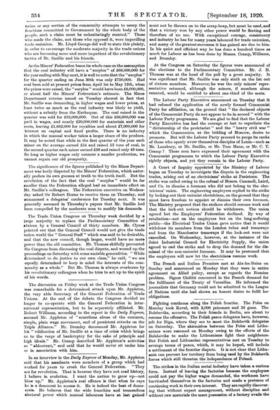As the Miners' Federation bases its whole case on the
assumption that the coal industry will have a " surplus " of £66,000,000 for the year ending with May next, it is well to note that the " surplus" for the quarter ending on June 30th was only £750,000, Had coal been sold at present prices from April 1st to May 12th, when the prices were raised, the " surplus " would have been £8,000,000, or about half the Miners' Federation's estimate. The Mines Department returns issued on Tuesday showed in fact that Mr. Smillie was demanding, in higher wages and lower prices, at least twice as much as the coal industry was likely to yield, without a subsidy from the Exchequer. The coal raised in the quarter was sold for £95,000,000. Out of this £66,000,000 was paid in wages, and nearly £20,000,000 for materials and other costs, leaving £1,662,000 for royalties and about £7,000,000 for interest on capital and fixed profits. There is no industry in which the manual worker takes a larger share of the produce. It may be noted that while in the first quarter of the year each miner on the average earned £54 and raised 53 tons of coal, in the second quarter each miner earned £56 and raised only 49 tons. So long as higher wages only connote a smaller production, we cannot regain our old prosperity.






































 Previous page
Previous page